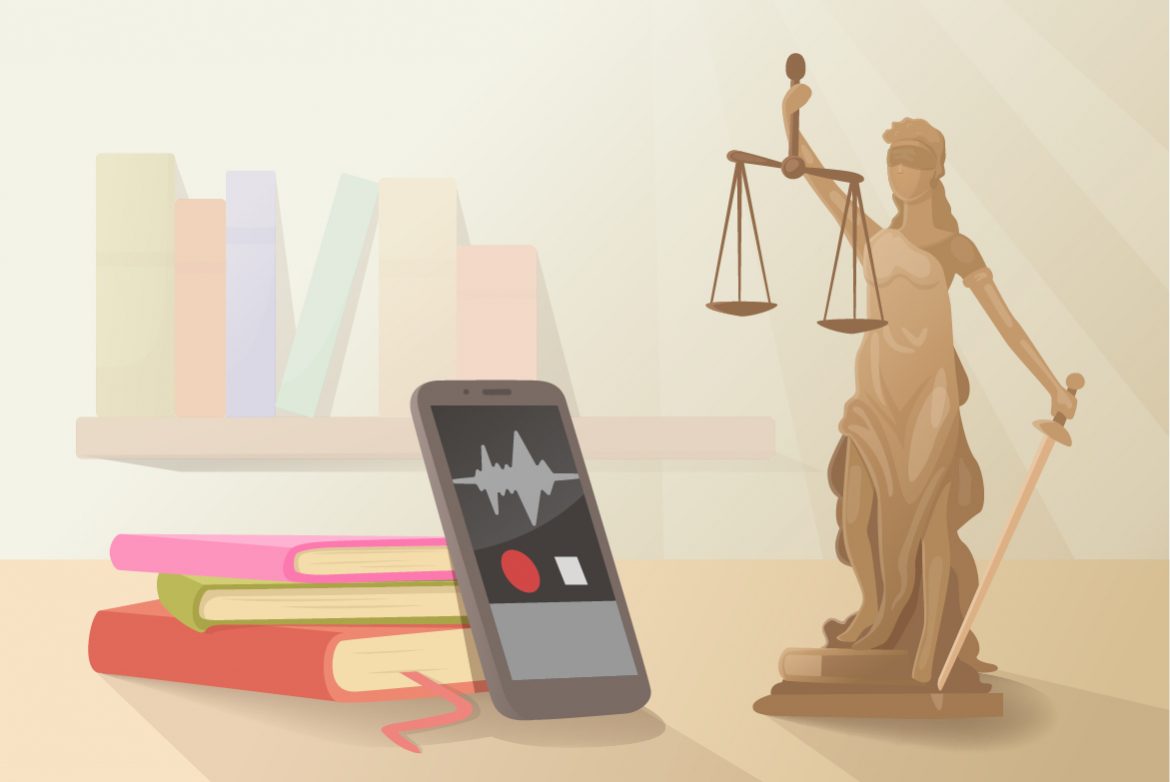Call recording apps have become a fantastic utility for both personal and professional functions. Every day, people all over the world are using these apps to help document meetings, ensuring that you never miss a single moment of a client or employee call. However, when utilizing a call recording app within the United States, it is essential to understand the laws and regulations that govern the practice of call recording.
In the United States, each state has individual laws and regulations. These specific state laws all bring with them certain relationships with various federal law and FCC regulations. And while this can all seem daunting, don’t worry! We’ve compiled for you an easy to understand breakdown of how call recording laws and regulations work all across the United States.
Note: while we always make our best attempt to be thorough, this article will naturally have a few omissions, so please do not consider this as professional legal advice but rather a helpful guidebook to assist you in understanding call recording laws in the United States.
When first learning all the ins and outs of United States call recording law, the two terms you need to look out for are “one-party consent” and “two-party consent.” And their definitions are very simple.
One-Party Consent: It is permissible to record a call as long as one person gives their consent. But here’s the catch. That person must be actively taking part in the conversation. If you were recording a phone call that a bystander was having, you would be in violation of privacy laws.
This basically means that if you participate in a call and you are using call recording, you do not need to inform the other side.
Most states in the US apply one-party consent.
Two-Party Consent: Every member present in the conversation must give their express permission before recording the call.
Two-Party Consent States
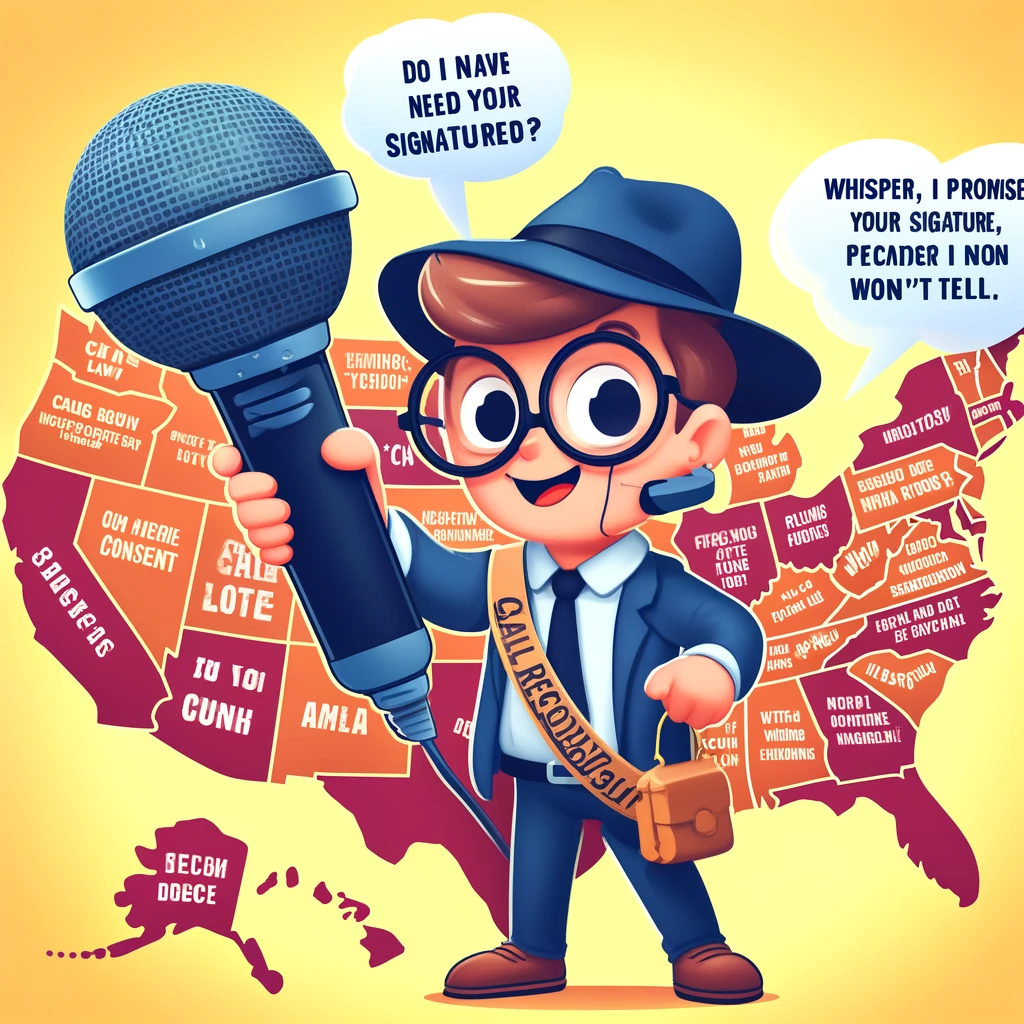
When you’re trying to make sense of call recording laws, it’s like being a detective on a map—except the clues are consent forms and the treasure is understanding your state’s regulations.
In the United States, we only have twelve states that apply two-party consent to their state laws. Those states are: California, Connecticut, Florida, Illinois, Maryland, Massachusetts, Michigan, Montana, Nevada, New Hampshire, Pennsylvania, and Washington.
In these states, it is the user’s responsibility to inform all members of the call that recording is taking place. In some states, specific laws do require that the telecom companies themselves notify users of any call recording. However, in almost all instances, the end-user recording the call would be far more likely to be held accountable for any neglect to report call recording.
However, if you use the KeKu app for your call recording purposes in any of the twelve two-party consent states, you don’t need to worry about this stressful responsibility! The KeKu call recording function will detect whether any member of the call is within one of the twelve two-party consent states and will automatically inform all parties that recording is taking place.
Single Party Consent States
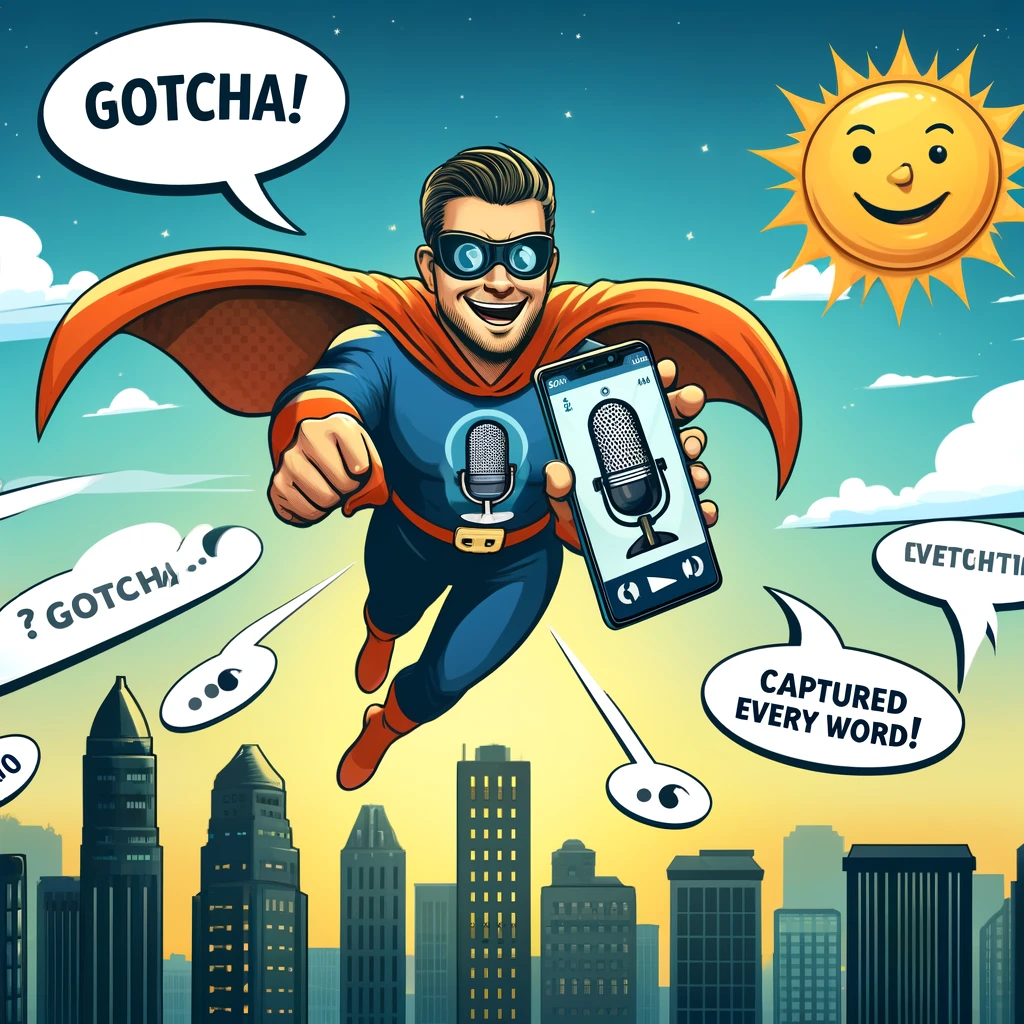
Imagine a world where your call recording app dons a cape and saves the day, one recorded conversation at a time—superhero style!
Alabama, Alaska, Arizona, Arkansas, Colorado, Delaware, District of Columbia, Georgia, Hawaii, Idaho, Indiana, Iowa, Kansas, Kentucky, Louisiana, Maine, Minnesota, Mississippi, Missouri, Nebraska, New Jersey, New Mexico, New York, North Carolina, North Dakota, Ohio, Oklahoma, Oregon, Rhode Island, South Carolina, South Dakota, Tennessee, Texas, Utah, Virginia, West Virginia, Wisconsin, Wyoming.
There is no state statute that regulates the interception of telephone conversations in Vermont.
State Specific Call Recording Laws and Regulations
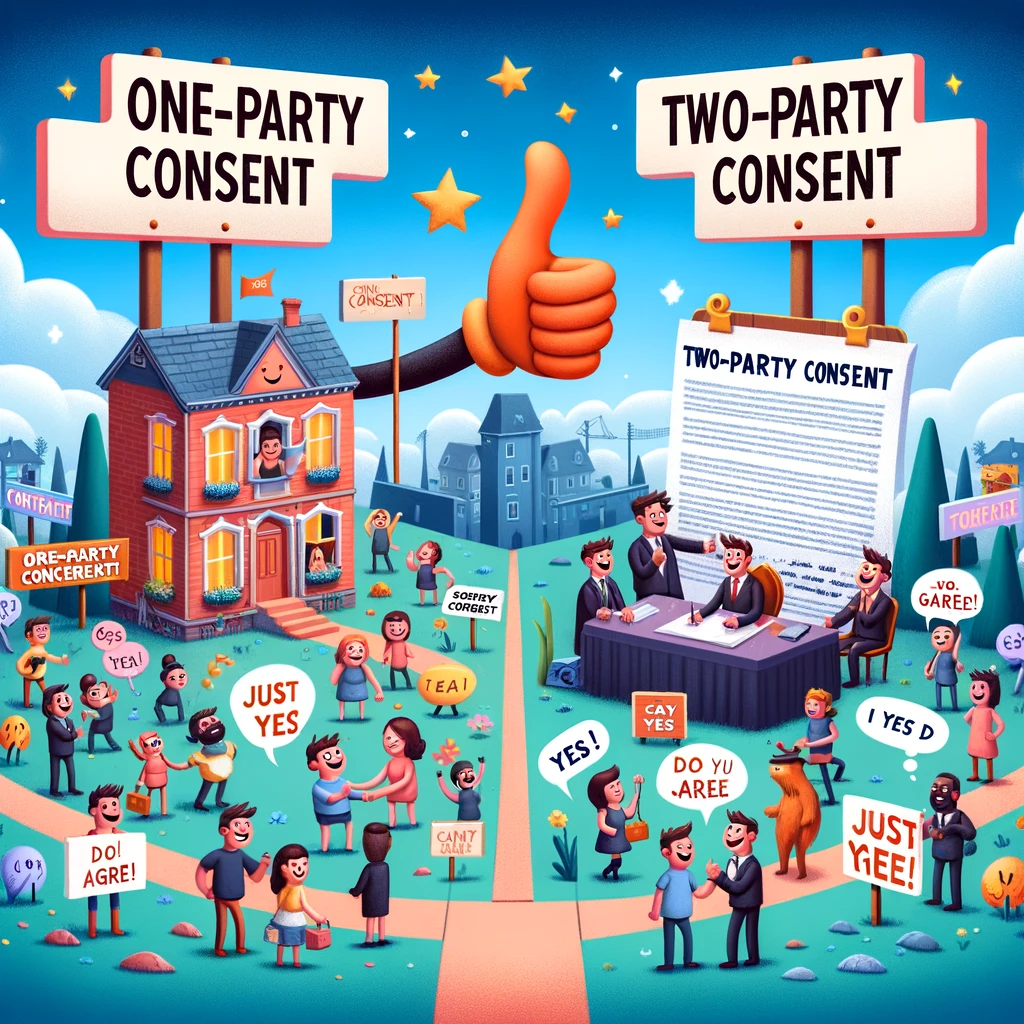
In the land of call recording, crossing from One-Party Consent Land to Two-Party Consent Town requires more than just a map—you need a legal guidebook, too.
California call recording laws
California is a two-party consent state. So let’s say your phone number or the person you are calling has a California area code, KeKu will do all the work of informing call recording practices for you. Note: if both parties have area codes based in one-party consent states and one member travels or now resides in California, you will need to disclose that call recording is taking place. So while KeKu has got you covered, it’s always best practice to inform all parties of call recording.
Call recording laws in Texas
Texas is a one-party consent state, so as long as you are an active participant in the call – you are in the clear!
Florida call recording laws
Florida is a two-party consent, so the rules here are very similar to California. The KeKu app has got you covered unless a party with a one-party consent area code has traveled to or now resides in Florida. In this instance, a disclosure is required.
New York call recording laws
New York is a one-party consent state. However, New York has a little quirk to its regulations: a different standard applies for outbound telemarketing calls. When calling from or into New York, telemarketers must disclose at the beginning of each call whether the call will be recorded. If after this disclosure, the remaining participants continue on with the conversation, then they have under the law in effect given their consent. This change makes New York an “all-party” consent state for purposes of outbound telemarketing campaigns.
Pennsylvania call recording laws
Pennsylvania is a two-party consent state, and therefore consent is required from all parties. KeKu will handle this for you if the area code is a PA one. However, if a member of the call has an area code from a one-party consent state but now resides or is traveling to PA, then disclosure is required.
Illinois call recording laws
Illinois is also a two-party consent state and therefore consent is needed from all parties. KeKu will handle this for you if the area code is from Illinois. However, if a member of the call has an area code from a one-party consent state but now resides or is traveling to Illinois, then disclosure is required.
Call recording laws in Ohio
Ohio is a one-party consent state, and therefore only one active member of the call needs to disclose and consent to the call recording.
Georgia call recording laws
Georgia as well is a one-party consent state, and therefore only one active member of the call needs to disclose and consent to the call recording.
Call recording laws in Washington
Washington is a two-party consent state, and therefore consent is required from all parties. KeKu will handle this for you if the area code is from Washington. However, if a member of the call has an area code from a one-party consent state but now resides or is traveling to Washington, then disclosure is required.
Call recording laws in New Jersey
New Jersey is a one-party consent state, and therefore only one active member of the call needs to disclose and consent to the call recording.
North Carolina call recording laws
North Carolina is a one-party consent state and therefore only one active member of the call needs to disclose and consent to the call recording.
Michigan call recording laws
Michigan is a two-party consent state, and therefore consent is required from all parties. KeKu will handle this for you if the area code is from Massachusetts. However, if a member of the call has an area code from a one-party consent state but now resides or is traveling to Massachusetts, then disclosure is required.
Call recording laws in Virginia
Virginia is a one-party consent state, and therefore only one active member of the call needs to disclose and consent to the call recording.
Call recording laws in Arizona
Arizona is a one-party consent state, and therefore only one active member of the call needs to disclose and consent to the call recording
Call recording laws in Massachusetts
Massachusetts is a two-party consent state, and therefore consent is required from all parties. KeKu will handle this for you if the area code is from Massachusetts. However, if a member of the call has an area code from a one-party consent state but now resides or is traveling to Massachusetts, then disclosure is required.
Federal Law and FCC Regulations for Call Recording
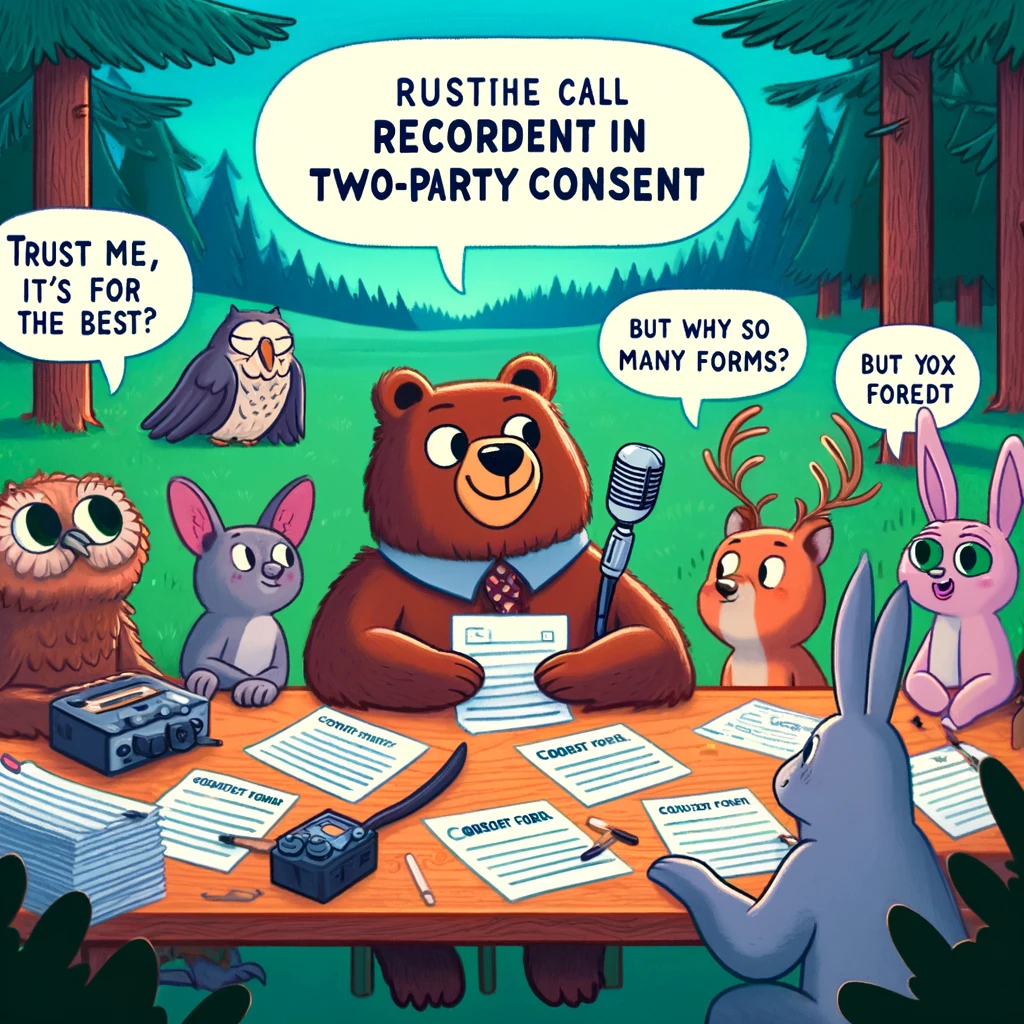
Even the animal kingdom has to navigate the tricky waters of two-party consent laws. Just imagine a bear trying to explain to a deer why it needs to sign a consent form!
Federal laws and FCC regulations primarily work under a one-party consent umbrella. However, state law trumps these statutes. So for the twelve two-party consent states, state law is king!
FCC regulation may affect the sharing of any recorded calls. Even with a disclosure of call recording, in almost all instances the concept of “confidential calling” is assumed. Therefore, if you are planning on sharing a recorded call, it is required to receive the consent from all members of the call before doing so. Note: consent to share a call must be separate from the consent you received to record the call!
United States call recording law can be a confusing business. Call recording apps like KeKu do their best to remove all the sticky particulars wrapped up inside of call recording. However, it’s always best to stay on the safe side and ask for permission – but in the end, the choice to do so is yours and yours alone.
Other call recording apps may or may not integrate disclosure function. So with KeKu, you are always staying on the safe side when utilizing call recording capabilities!
Stay Ahead with KeKu: Navigating Call Recording Laws Made Easy
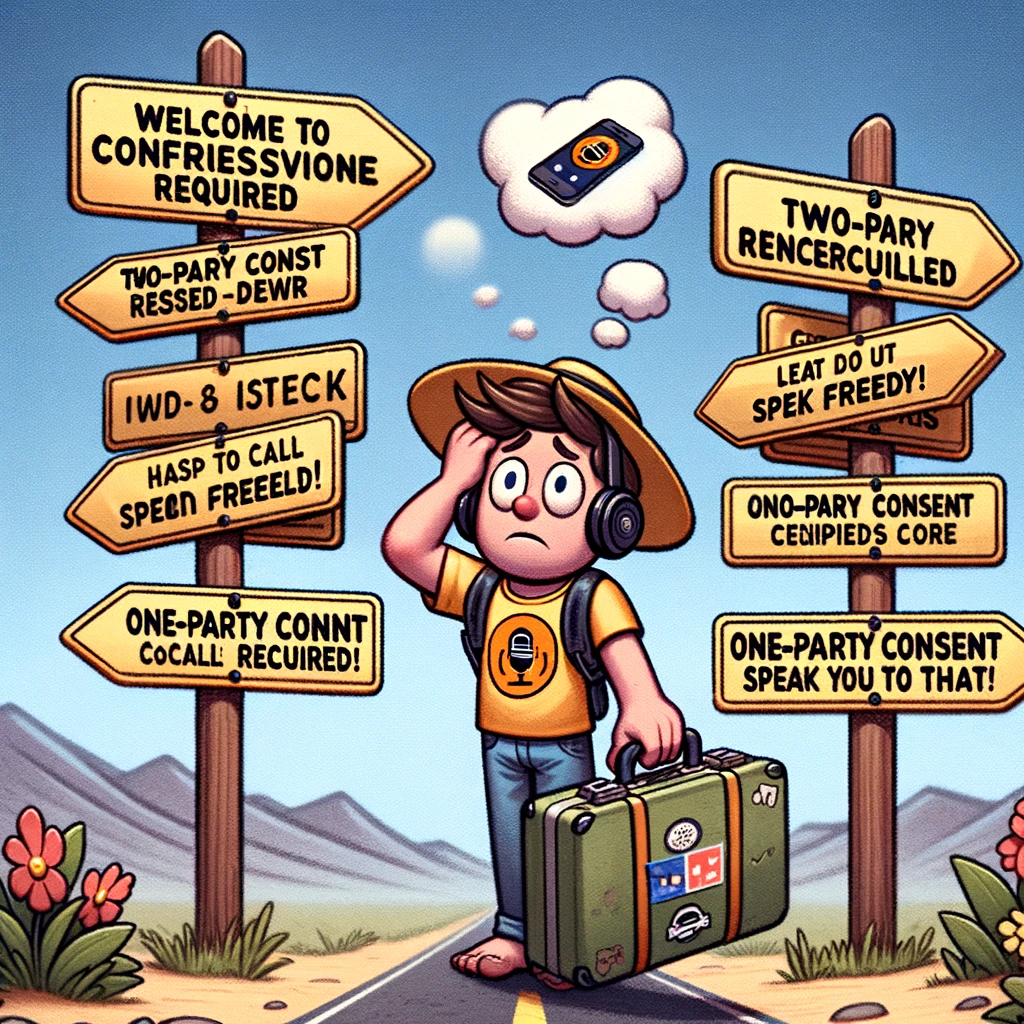
Traveling through the United States with a bag full of recording gadgets? Only KeKu can guide you through the maze of call recording laws from state to state without getting lost.
In the ever-evolving landscape of call recording laws across the United States, staying compliant while leveraging the power of call recording can feel like navigating through a maze. This is where KeKu steps in, transforming complexity into simplicity, ensuring that you’re always a step ahead. Whether you’re a business professional aiming to document important discussions or an individual looking to capture memorable conversations, understanding the ins and outs of call recording laws is crucial. But worry not, KeKu’s innovative solutions are designed with your needs and legal compliance in mind.
Seamless Compliance Across States: With KeKu, you no longer need to scratch your head over one-party and two-party consent states. Our app intelligently recognizes the legal requirements based on the location of each party involved, adjusting notification and consent protocols accordingly. This means you can focus on what truly matters—your calls—while we handle the legality.
Effortless Call Recording with KeKu: Imagine being able to record calls effortlessly, knowing each recording complies with state laws. KeKu’s call recording feature is built to provide peace of mind, with automated consent notifications where required. Now, documenting important calls or capturing moments with loved ones is just a tap away—simple, secure, and always compliant.
Unlocking the Power of Call Recording: Beyond legal compliance, KeKu unlocks the full potential of call recording. From improving customer service through quality assurance to safeguarding your business against disputes, the benefits are manifold. With KeKu, each call recorded is a step towards operational excellence and personal peace of mind.
KeKu: Your Trusted Partner in Call Recording: In the fast-paced world where communication is key, KeKu stands as your trusted partner. We’re more than just a call recording app; we’re a solution designed to keep you compliant, efficient, and ahead of the curve. With KeKu, navigating the complex terrain of call recording laws is a breeze, letting you harness the full benefits of call recording without the legal headache.
Embrace the future of call recording with KeKu, where compliance meets convenience. Explore our features and discover how we can help you stay compliant, efficient, and focused on what truly matters—connecting with people around the world, worry-free.
